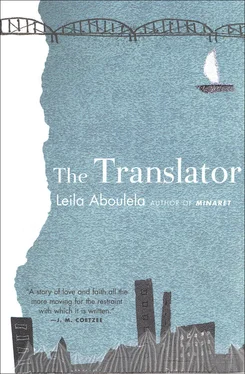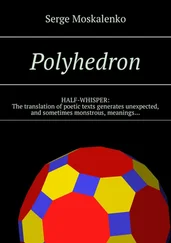‘But why golf?’ she asked. ‘Why specifically golf?’ And he laughed for the first time that day.
On Boxing Day and the weekend that followed and on Hogmanay, before the streets filled again with cars and schoolchildren, before the other tenants came back from their holidays, Sammar waited by the landing armed against the cold: layers of wool, socks, a cushion to sit on, barrier against the floorboards. The awkward time was the ringing of the telephone, the harsh sound of it and knowing that the call was for her, knowing who it would be. The first sentences were awkward too. Her name. Hello. The weather: snowing in Edinburgh. Frosty in Aberdeen, freezing.
‘How are you?’
‘How are you? How is Mhairi?’
‘What are you taking for your cold?’
He said that he’d read in the papers that thousands went abroad that time of year, in search of skiing or the sun. The popular destinations were the ski slopes of France or Tenerife. He said, ‘This is the best time of year for Morocco, Libya, the Middle East.’ Rae remembered a train ride in the seventies, from Tangiers south, to Marrakesh. Rain and then the sun came out into the crowded train. A man with a large moustache offered him a cigarette and they talked about the raid on Entebbe. Rae remembered a time when he could breathe like other people, when there was more air in the world.
She said, ‘We have a winter in Sudan, a cold that stays on the skin, does not punch inside to the bones, is content to crack people’s skin, turn it into the colour of ash.’ She said that the cold hurt when she was young and remembered the pouring of glycerin, burning, being told, don’t lick it off, don’t lick it off your lips. Or tasteless Vaseline, in plastic tubs, with grains of sand, brown and coarse in the thick silver mess. Or Nivea cream, the blue tin of luxury that came with a German ad on TV.
He asked her, ‘Which is bluer: the Nile or Nivea tins?’
She said that colours made her sad. Yellow as she knew it and green as she knew it were not here, not bright, not vivid as they should be. She had stacked the differences; the weather, the culture, modernity, the language, the silence of the muezzin, then found that the colours of mud, sky and leaves, were different too.
He said, his voice changed by flu, ‘The Nile is bluer. Did you not look at it, did you instead watch Peyton Place on TV? I ask because in the West Bank, the children threw stones at the soldiers in the mornings and watched Dallas at night sitting together on the floor.’
She said, ‘At night we used to sleep outdoors. We used to pull our beds out at sunset, so that the sheets would be cool later. It was so hot that sheets taken out of a cupboard, spread out to lie on were too unpleasant, they had to be cooled first. Every night, I saw bats in the clouds and the grey blur of a bird. And around the moon was another light, always the same shape. In the distant past, Muslim doctors advised nervous people to look up at the sky. Forget the tight earth. Imagine that the sky, all of it, belonged to them alone. Crescent, low moon, more stars than the eyes looking up at them. But the sky was free, without any price, no one I knew spoke of it, no one competed for it. Instead, one by one those who could afford it began to sleep indoors in cool, air-conditioned rooms, away from the mosquitoes and the flies, away from the azan at dawn. Now when they build houses, when they build apartment blocks, they don’t build them with places for people to sleep outdoors. It is a thing of the past, something I remember from my past.’
He said, ‘This is the enemy, what is irreversible, what has already reached the farthest of places. There is no going back. They can bomb bus-loads of tourists, burn the American flag, but they are not shooting the enemy. It is already with them, inside them, what makes them resentful, defensive, what makes them no longer confident of their vision of the world.’
She thought about that, he made her think. The landing existed with the bicycles under the stairs and the winter sun seeping through the edges of the letter box. But all that was unreal, superseded. What was real was that she had been given permission to think and talk, and he would not be surprised by anything she said. As if he had given her a promise, never to be taken aback. Surprise was part of the city, the granite buildings, the buses that went down the narrowest of roads. There were shades of surprise: surprise-sneer, surprise-embarrassed, surprise-bemused, surprise-disapproving. She had to be silent. Use her teeth and lips to keep silent.
Now the rules were being broken. They broke when she said, in Rae’s flat, her fingers on the magazine, ‘I used to wear a uniform like that in school.’ The rules broke and burst her head in little bright pieces.
First African night. She spoke first, for like him she was born in this wintery kingdom. Like him Africa was arrived at and loved.
They came from London at night. A father with a successful degree, a mother who had given birth to her children abroad, a seven-year-old Sammar. It was her first time on an airplane, that was her excitement in the weeks before, not where she was going. Home was a vague place, a jumble of what her mother said. Home was a grey and white place like in the photographs of her cousins which arrived air mail. It was the airplane, the airplane, in the weeks before the flight. New clothes to wear on the airplane, a doll to keep her quiet, can she sit near the window? Can she open the window? A smooth oval window. The beauty of the tray the hostess brings, the perfect cups, the plates filled with different things, hot, cold, different colours. Sugar in a packet, a toothpick for her to unwrap and play with, poke the eyes of the doll. Then the smallest pillow to sleep on. Can we take the pillow with us? Why not? Why not?
There were many people waiting for them in the car park of Khartoum airport. People who made a fuss and spoke at the same time. A woman burst into tears, men hugged her father, children stared at Sammar. Her cousins, Hanan and Tarig. They curiously shook her hand. Ahmed Ali Yasseen was there. He picked her up and lifted her high above the cars and the other children. She was above them all. He said, ‘What did you get me from London?’ ‘Nothing,’ she shrugged and he laughed and everyone who heard her laughed too. And she did not understand what they found funny, she was just happy to be carried, lifted up. She was at that age when she was often told, you are too old to be carried, you are too heavy, you are a big girl now.
Their luggage disappeared into different cars. Sammar and her parents were separated too in different cars, going to the same place, her aunt’s house for dinner and to spend the night. Sammar rode with ‘Am Ahmed in his Toyota pick-up van. She sat with his wife, in the front seat and Tarig rode in the back. He kept standing up and being told off by ‘Am Ahmed, ‘Sit down properly boy, or I’ll bring you in front with me.’ But Tarig could never be still, it was in his nature to be always jumping about, attracting attention. Sammar thought he was silly. Later as the months went by she thought him brave, brave and silly mixed up together, doing forbidden things she did not have the courage to do, like playing with the razors they found in the dust or riding their bicycles on the busy, main roads.
Her aunt’s house was not far away, it was not a long drive. On the telephone Rae asked, ‘How far?’
‘Not far,’ she replied, and moved the receiver from one hand to the other, one ear to the other, ‘not far, like from Holburn Street to Old Aberdeen. And it was late at night so there was not much traffic. Khartoum is poorly lit at night. To someone not used to it, it would appear gloomy, warm and dull. When one of the street lights goes off, it’s a long time before it is fixed, weeks and months. But there is no fear in the dark. The streets are safe except for the stray dogs, and the open drains, holes in the pavements through which anyone can easily fall.’
Читать дальше












